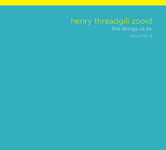|
|
 |
Dusted Reviews
Artist: Henry Threadgill Zooid Album: This Brings Us To, Vol. 2 Label: Pi Recordings Review date: Nov. 19, 2010 |

|
|
|
 |
Zooid, Henry Threadgill’s most recent performing group, has now been together for about 10 years, a fact apparent in every note on this, the band’s third fourth release. Really, 2001’s Up Popped the Two Lips has very little to do with the music on the two volumes of This Brings Us To. The band is the same as on the first volume — Threadgill on alto saxophone and flute, guitarist Liberty Ellman, Jose Davilla on trombone and tuba, Stomu Takeishi on acoustic bass, and drummer Humberto Kavee — the quintet has refined its language to a point that every gesture carries weight, and every note seems to spring organically from its parent composition.
Precursors to this organic type of improvisation/composition might include works by Andrew Hill and Cecil Taylor, as well as much of the AACM’s early output, but Threadgill’s musical language bears almost no resemblance to these. His music for Zooid is a winning combination of early modern harmony — think Schoenberg and Berg’s take on pantonality, circa 1908 — with loosely funky rhythms supporting some complex counterpoint. There is a fair amount of pointillism at play, but it’s in the service of rhythms too steady to be simply labeled expressionistic. Listen to the way “Lying Eyes” slides and bounces into existence and grows from hushed textures to the unisons that define its main melodic components, Kavee’s cymbals and Ellman’s straight-toned guitar carrying the tune along. The title track inhabits similar territory, but as with the rest of the album, every harmony is implied rather than specifically stated.
The same is true where genre is concerned. Even when Threadgill’s alto enters, there is very little that bespeaks any one tradition. Rather, the quintet’s language references something between modern classical and what the AACM labels “great black music,” but the hybrid is never forced. The group interacts in brief bursts of activity that renders the idea of a single soloist superfluous. For an even better example, check out the infectious groove on “It Never Moved,” maybe the most overtly energetic track on offer. Threadgill growls and slides as the others provide full but transparent accompaniment, rhythmic accents in constant flux.
Special mention must be made of Takeishi and Davila. I have never heard a tuba player exhibit such flexibility of tone, and similar qualities in Takeishi’s playing make both bass and tuba sound like rhythm instruments. Takeishi rattles and plucks his way through such rhythmic intricacies as to boggle the brain, and then with one deftly inserted downward gliss, he focuses the whole group. Sometimes, it’s difficult to tell which is bass and which is tuba, and their complex exchanges are always rewarding.
In one sense, Zooid is a logical progression for Threadgill, the next step in an evolution of intricate orchestration that began with X-75. That said, each of his projects has been quite different, having little in common with what preceded it. While it is tempting to see This Brings Us To as a summation of Threadgill’s explorations in harmony and timbre, it’s really another leg of a fascinating and fruitful compositional journey.
By Marc Medwin
|







